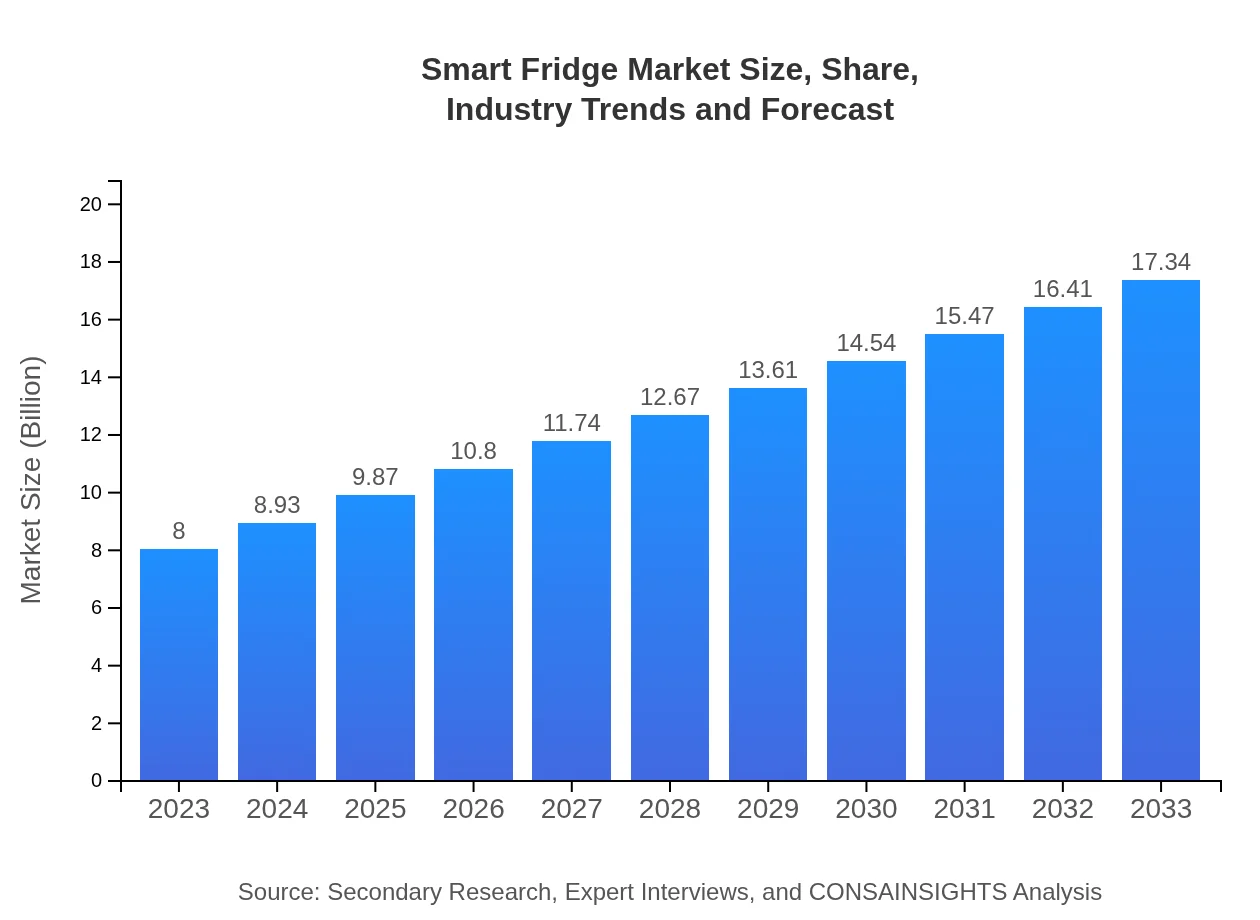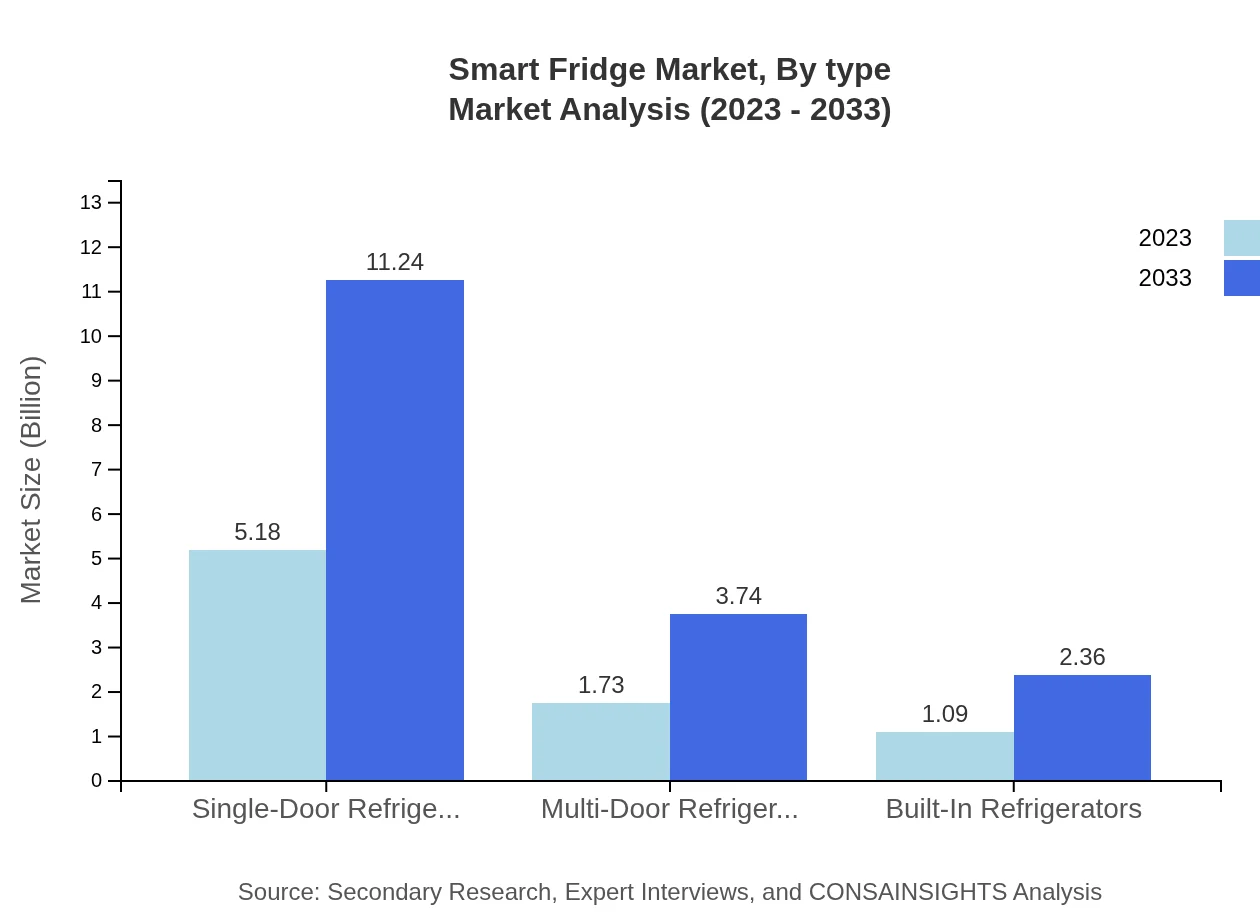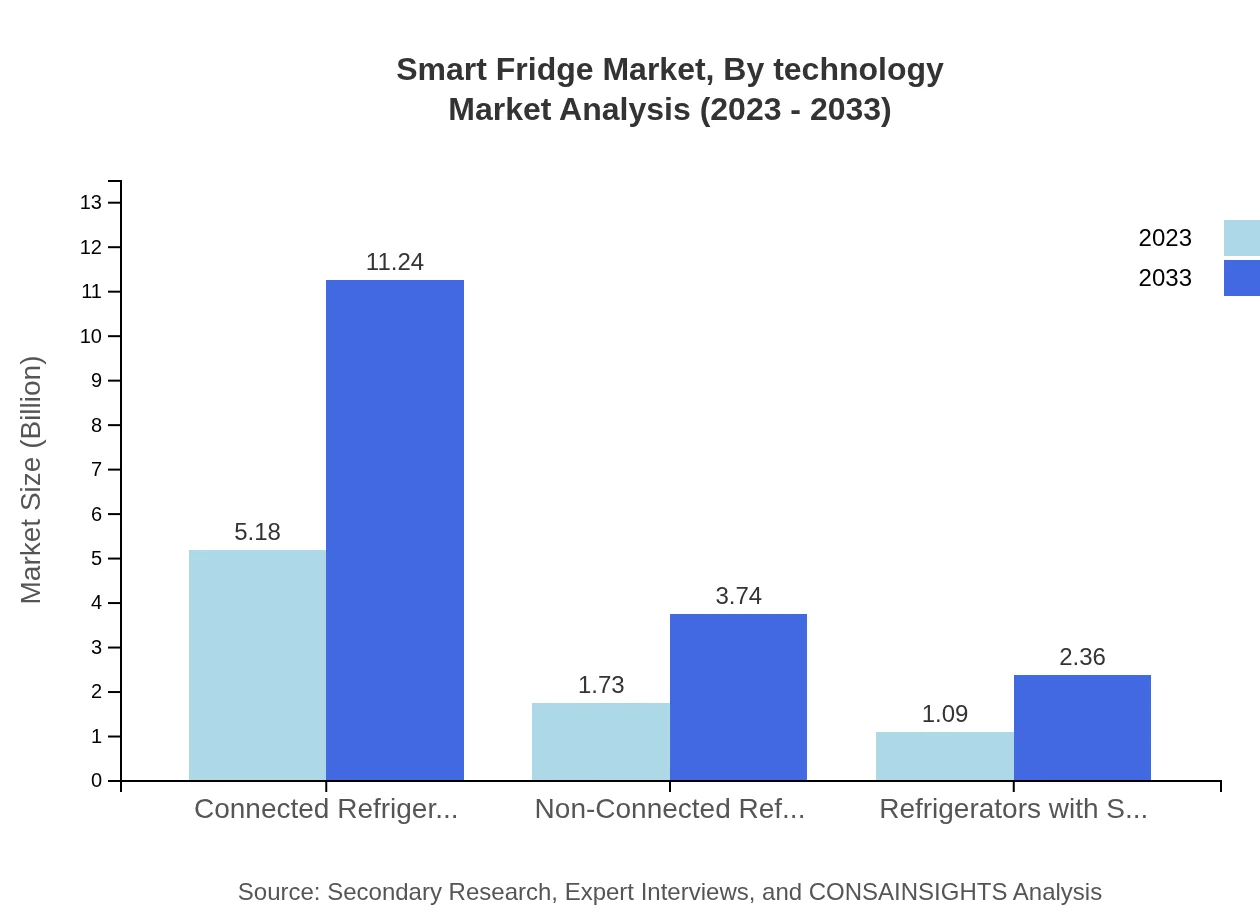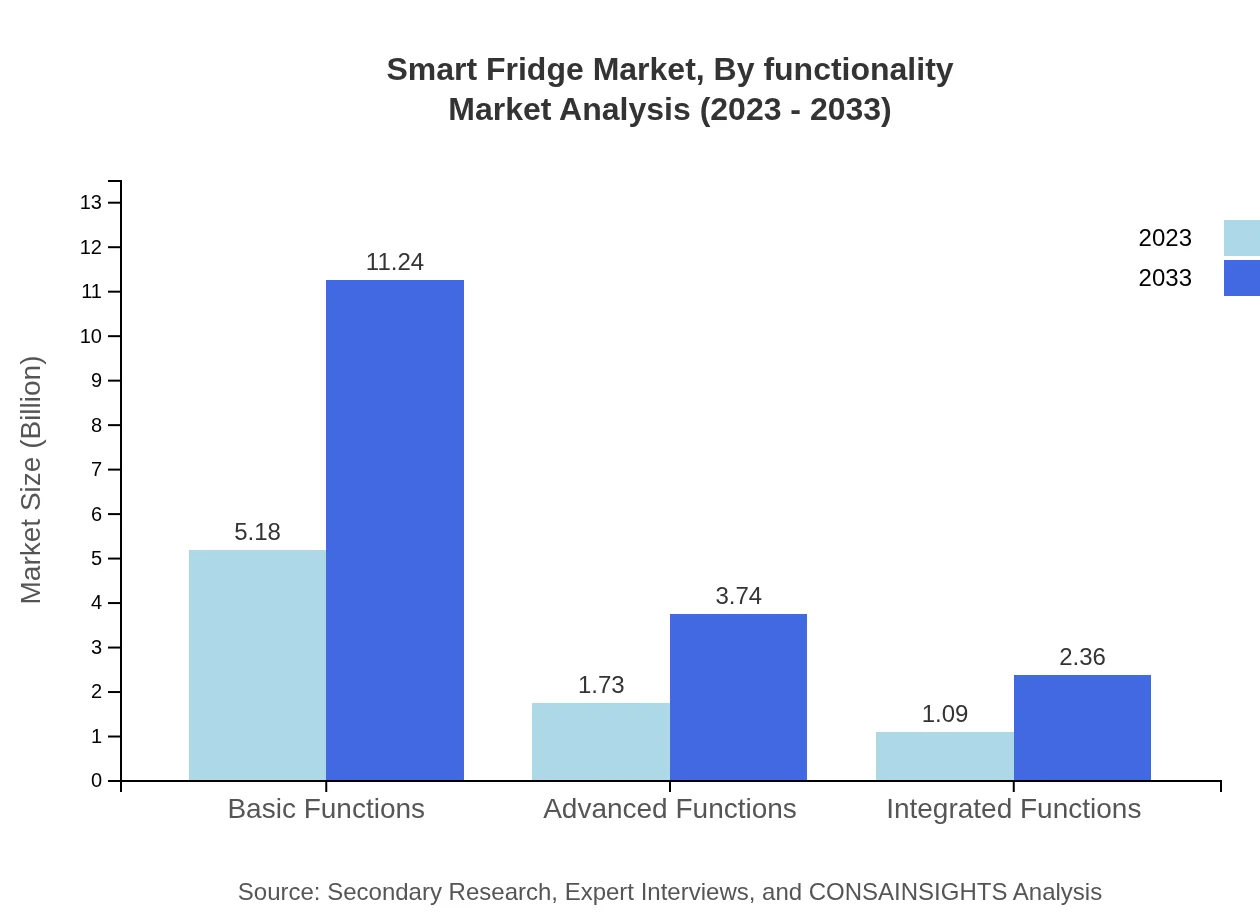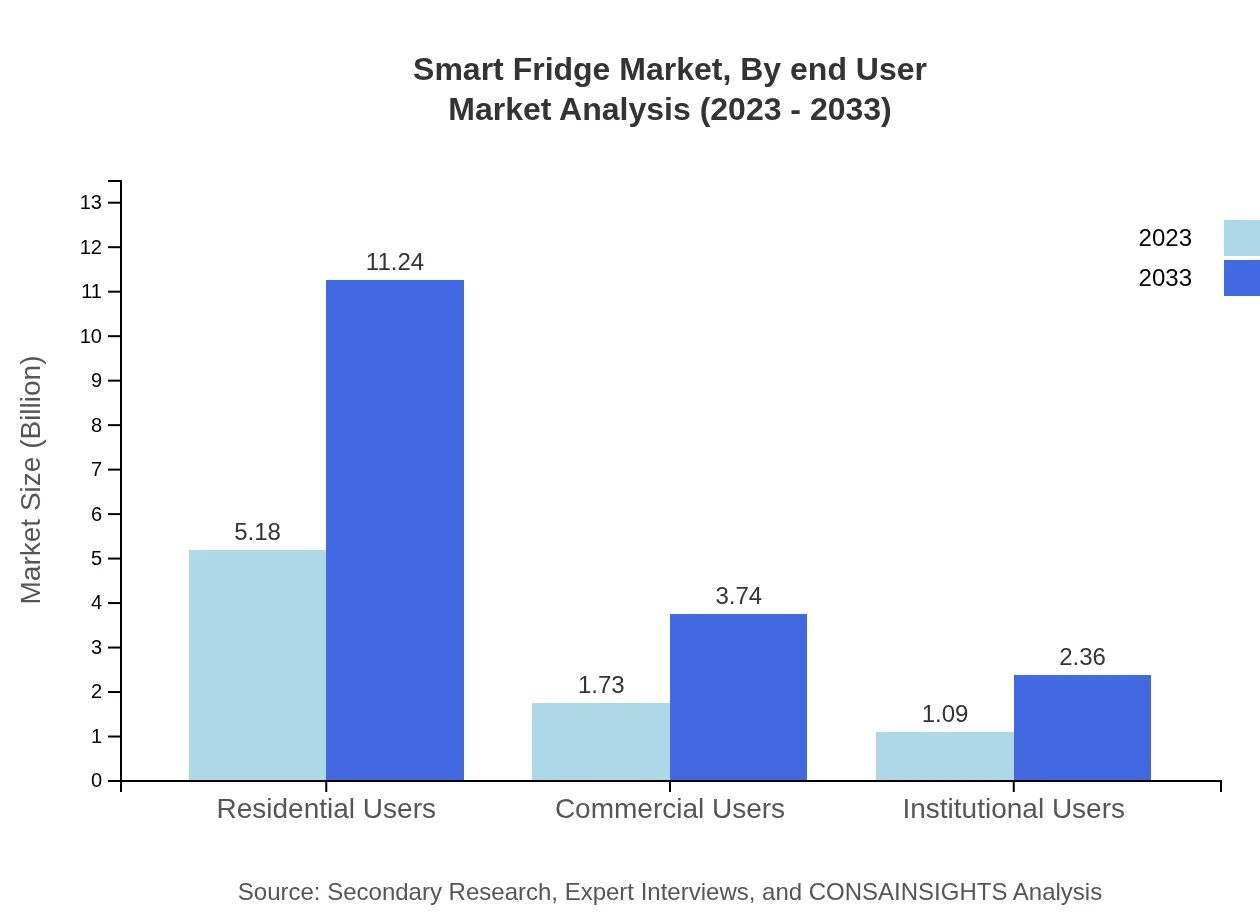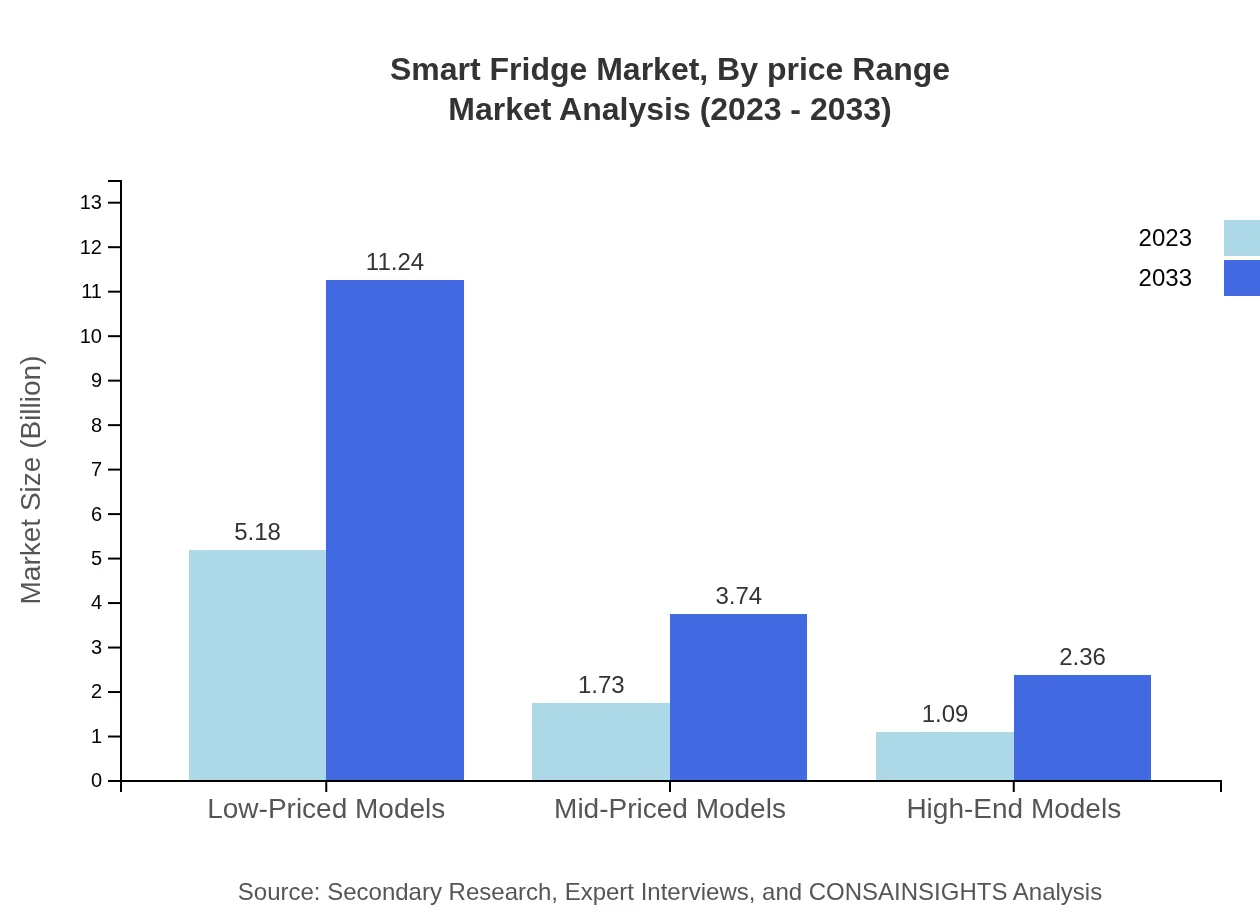Smart Fridge Market Report
Published Date: 24 January 2026 | Report Code: smart-fridge
Smart Fridge Market Size, Share, Industry Trends and Forecast to 2033
This report provides a comprehensive analysis of the Smart Fridge market, including market size, growth trends, segmentation, regional insights, and future forecasts from 2023 to 2033. It aims to equip stakeholders with critical information for strategic decision-making.
| Metric | Value |
|---|---|
| Study Period | 2023 - 2033 |
| 2023 Market Size | $8.00 Billion |
| CAGR (2023-2033) | 7.8% |
| 2033 Market Size | $17.34 Billion |
| Top Companies | Samsung Electronics, LG Electronics, Whirlpool, Bosch |
| Last Modified Date | 24 January 2026 |
Smart Fridge Market Overview
Customize Smart Fridge Market Report market research report
- ✔ Get in-depth analysis of Smart Fridge market size, growth, and forecasts.
- ✔ Understand Smart Fridge's regional dynamics and industry-specific trends.
- ✔ Identify potential applications, end-user demand, and growth segments in Smart Fridge
What is the Market Size & CAGR of Smart Fridge market in 2023?
Smart Fridge Industry Analysis
Smart Fridge Market Segmentation and Scope
Tell us your focus area and get a customized research report.
Smart Fridge Market Analysis Report by Region
Europe Smart Fridge Market Report:
With a market size of $2.90 billion in 2023, Europe is projected to grow to $6.29 billion by 2033. These trends are influenced by robust environmental regulations, leading consumers to invest more in energy-efficient smart appliances.Asia Pacific Smart Fridge Market Report:
In 2023, the Smart Fridge market in Asia Pacific is valued at $1.45 billion, with expectations to reach $3.15 billion by 2033. The growth is underpinned by urbanization, increasing disposable incomes, and a growing trend toward smart homes, particularly in emerging economies like China and India.North America Smart Fridge Market Report:
North America presents a robust market, valued at $2.66 billion in 2023, anticipated to grow to $5.77 billion by 2033. This growth is propelled by high demand for advanced technology in home appliances driven by sustainability trends and consumer preference for automated solutions.South America Smart Fridge Market Report:
The South American market, valued at $0.17 billion in 2023, is projected to rise to $0.37 billion by 2033. The region is experiencing gradual adoption of smart appliances, driven by increasing consumer awareness and a push for energy-efficient products.Middle East & Africa Smart Fridge Market Report:
The Middle East and Africa market, valued at $0.81 billion in 2023, is expected to increase to $1.76 billion by 2033. Growth in this region is driven by increasing modernization and urbanization, coupled with a trend toward convenience technologies in home appliances.Tell us your focus area and get a customized research report.
Smart Fridge Market Analysis By Type
The market by type shows Single-Door refrigerators leading with a size of $5.18 billion in 2023, projected to grow to $11.24 billion by 2033, accounting for 64.81% market share. Multi-Door refrigerators follow with $1.73 billion in 2023, expected to reach $3.74 billion by 2033 with a share of 21.58%. Built-In refrigerators stand at $1.09 billion in 2023, growing to $2.36 billion with a 13.61% market share, appealing mainly to luxury segment consumers.
Smart Fridge Market Analysis By Technology
In terms of technology, Connected Refrigerators dominate with $5.18 billion in market size for 2023, growing to $11.24 billion, holding a share of 64.81%. Non-Connected Refrigerators, while still substantial, are valued at $1.73 billion in 2023 and expected to double to $3.74 billion, representing 21.58% of the market. Refrigerators with Smart Sensors are also gaining traction, valued at $1.09 billion in 2023, expected to grow to $2.36 billion, reflecting 13.61% market share.
Smart Fridge Market Analysis By Functionality
The Smart Fridge market by functionality shows Basic Functions leading with a size of $5.18 billion in 2023, projected to grow to $11.24 billion and holding a significant 64.81% share. Advanced Functions, valued at $1.73 billion, are expected to grow to $3.74 billion, representing 21.58%. Integrated Functions are also significant at $1.09 billion in 2023, and anticipated to grow to $2.36 billion, reflecting a 13.61% market share.
Smart Fridge Market Analysis By End User
Segments by end-user show Residential Users at $5.18 billion in 2023, expected to grow to $11.24 billion, commanding 64.81% of the market. Commercial Users are valued at $1.73 billion, projected to reach $3.74 billion by 2033, holding 21.58% share. Institutional Users, at $1.09 billion, are expected to grow to $2.36 billion, reflecting 13.61% share.
Smart Fridge Market Analysis By Price Range
By price range, Low-Priced Models lead the market with a size of $5.18 billion in 2023, growing to $11.24 billion while maintaining 64.81% share. Mid-Priced Models are valued at $1.73 billion, projected to grow to $3.74 billion, holding 21.58%. High-End Models, valued at $1.09 billion in 2023, are expected to grow to $2.36 billion, reflecting 13.61% market share.
Smart Fridge Market Trends and Future Forecast
Tell us your focus area and get a customized research report.
Global Market Leaders and Top Companies in Smart Fridge Industry
Samsung Electronics:
Samsung is at the forefront of smart fridge technology, offering consumer appliances with advanced features like Family Hub, which integrates smart technology for better food management.LG Electronics:
LG is known for its InstaView technology, allowing users to knock twice to see inside the fridge without opening the door, enhancing both efficiency and energy savings.Whirlpool:
Whirlpool’s range of smart fridges emphasizes energy efficiency and practicality, featuring adaptive cooling technologies tailored to consumer lifestyles.Bosch:
Bosch focuses on premium and high-efficiency models, integrating smart technologies to optimize storage and improve user-friendliness in the kitchen.We're grateful to work with incredible clients.









FAQs
What is the market size of smart Fridge?
The smart fridge market is projected to grow from $8 billion in 2023, with a CAGR of 7.8%, indicating strong demand and innovation in this sector over the next decade.
What are the key market players or companies in this smart Fridge industry?
Key players in the smart fridge market include Samsung, LG Electronics, Whirlpool, Bosch, and Haier. These companies are recognized for their innovative solutions and high-quality products, driving competitive dynamics.
What are the primary factors driving the growth in the smart Fridge industry?
Growth in the smart fridge industry is driven by technological advancements, increasing consumer demand for energy-efficient and connected appliances, and the rise of smart homes, enhancing convenience and energy management.
Which region is the fastest Growing in the smart fridge?
The fastest-growing region for smart fridges is Europe, expected to expand from $2.90 billion in 2023 to $6.29 billion by 2033, showcasing rapid adoption of smart technology in household appliances.
Does ConsaInsights provide customized market report data for the smart Fridge industry?
Yes, ConsaInsights offers customized market reports tailored to specific needs within the smart fridge industry, enabling detailed insights and analytics based on unique business requirements.
What deliverables can I expect from this smart Fridge market research project?
Deliverables include detailed market analysis, forecasts, competitive landscape assessments, segment insights by type and region, and strategic recommendations for market entry or expansion.
What are the market trends of smart fridge?
Trends in the smart fridge market include increasing connectivity features, growing interest in integrated functions like smart sensors, and a shift towards energy-efficient models, with an emphasis on sustainability.

